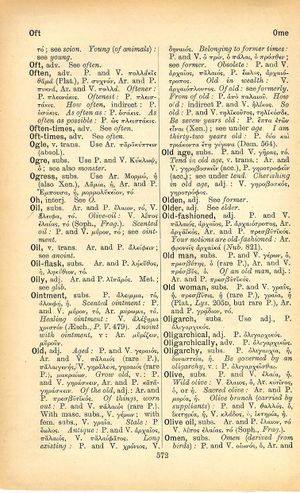omen
λογισάμενος ὅτι καὶ ἐκ νεκρῶν ἐγεῖραι δυνατὸς ὁ Θεός → in the belief that God was able to raise him up from the dead
English > Greek (Woodhouse)
subs.
Omen (derived from birds): P. and V. οἰωνός, ὁ, Ar. and V. ὄρνις, ὁ, or ἡ, V. πτερόν, τό, Ar. and V. σύμβολος, ὁ (also Xen.). Derived from any sound: P. and V. φήμη, ἡ, V. κληδών, ἡ, Ar. and V. φάτις, ἡ. Portent: P. and V. φάσμα, τό, τέρας, τό, σημεῖον, τό, V. σῆμα, τό. I aocept as an omen the crown that marks your victory: V. οἰωνὸν ἐθέμην καλλίνικα σὰ στέφη (Eur., Phoen. 858). With prosperous omen: V. ὄρνιθι . . . αἰσίῳ (Soph., O.R. 52; cf. also Ar., Ar. 717-721). (The mutilation) seemed an omen of the fate of the expedition: P. (ἡ περικοπὴ) τοῦ ἔκπλου οἰωνὸς ἐδόκει εἶναι (Thuc. 6, 27). Take the omens, v.: P. οἰωνίζεσθαι (Xen.) (absol.), V. οἰωνοσκοπεῖν (absol.). Have good omens: Ar. and P. καλλιερεῖσθαι (absol.).

